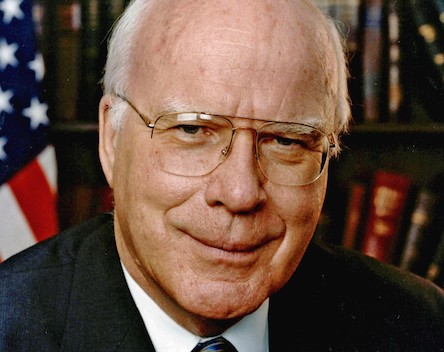Leahy: Pay for Play Must Be Disallowed

The smarter way to stay on top of broadcasting and cable industry. Sign up below
You are now subscribed
Your newsletter sign-up was successful
Sen. Patrick Leahy (D-Vt.) says that he can't support any approach to network neutrality that allows for paid priority.
That came in a field hearing on the issue held at the University of Vermont in Burlington.
He said from the outset that he can't endorse any approach to rules that do otherwise than ban pay for play.
Witness Michael Copps, former FCC chair and now an advisor to Common Cause, said that the FCC made a mistake by not classifying Internet access under common carrier regs and that the only way to prevent paid priority and protect an open Internet is to reclassify it under that Title II common carrier regime.
Leahy said the reason he was holding the hearing in his home state was that many could not participate in the debate by going to Washington, but that it was critical that their voices be heard given the potential impact of network neutrality on Vermont and its economy. "And your voices will be heard," he said.
"The outcome of the debate is going to have a huge effect on small businesses, community institutions and consumers, so it is crucial that we get this right," he said. Leahy said he did not want to see an Internet where "those who can afford to pay can muffle the voices of those who cannot."
Leahy last month introduced a bill with Rep. Doris Matsui (D-Calif.) that would ban paid priority. He put in a plug for that bill, which drew plaudits from Copps and other witnesses.
The smarter way to stay on top of broadcasting and cable industry. Sign up below
Copps hammered on consolidation and fast and slow lanes, warning that the Internet was becoming the playground of the privileged few. It is decision time, he said.
FCC chairman Tom Wheeler has proposed reinstalling the FCC's anti-unreasonable discrimination rules as one that allows commercially reasonable discrimination. But he has made it clear, at least lately, that was a way to restore the anti-discrimination rule in a way that would pass muster with the D.C. federal appeals court that remanded the old rule back to the FCC.
Copps is no fan of that approach, saying only Title II will do.
He lit into the FCC, saying that public policy has too often worked against the Internet, with armies of lobbyists with wheelbarrows full of money pushing mergers through with the general acquiescence of the commission.
He said that until the FCC classifies Internet access as a Title II service, there will be no open Internet. "There is no clever, 'other' way to get this done," he said. And after the FCC classifies access under Title II, Copps wants it to tackle interconnection and peering issues. He said the blocking and discrimination can take place upstream as well as down, and that consumers don't care where it happens.
Rep. Peter Welch (D-Vt.) was also in attendance. He said Vermont would not have an economy without an accessible Internet.
Contributing editor John Eggerton has been an editor and/or writer on media regulation, legislation and policy for over four decades, including covering the FCC, FTC, Congress, the major media trade associations, and the federal courts. In addition to Multichannel News and Broadcasting + Cable, his work has appeared in Radio World, TV Technology, TV Fax, This Week in Consumer Electronics, Variety and the Encyclopedia Britannica.

